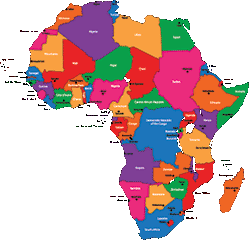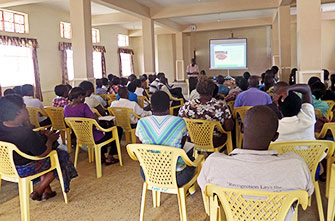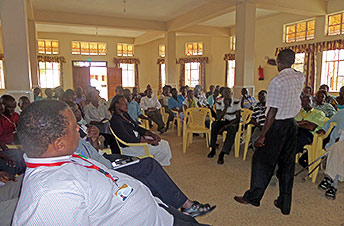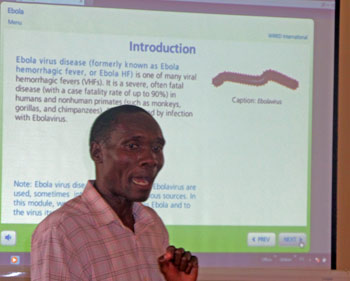|
WiRED Launches Prevention Education Program on Ebola in East Africa
BY ALLISON KOZICHAROW, EDITED BY BERNICE BORN
P
 Click image to enlarge
Click image to enlarge
reparing people—helping them understand prevention—can be key in combating any epidemic. WiRED International and our partners pledge to stay ahead of the curve by training people in unaffected areas of Africa in advance of any Ebola intrusion.
Familiarizing people in all communities—from small villages to urban districts—will help prevent the spread of Ebola. The key to stopping rapid spread of the illness is to teach populations how to ready themselves and their families to avoid contracting the illness. West Africa was wholly unprepared for Ebola, and efforts to contain and treat the virus have superseded prevention. Now is the time to educate communities in the rest of Africa BEFORE Ebola can strike.
 Click image to enlarge
Click image to enlarge
WiRED International is attempting to provide its Ebola training material in West Africa, where the virus is raging through the population, but the illness is creating mass fear and chaotic conditions that make it difficult for aid workers to help with education. Most are attending to the needs of the ill and burials of the dead, and so there aren’t many aid workers available to teach people about prevention. It’s clear that once the virus takes hold, unstable conditions work against orderly public education.
WiRED’s Ebola training module provides an introduction to Ebola, explaining where the virus originated, the signs and symptoms of the illness, the treatments, and most important, prevention to help people avoid contracting the disease. The Ebola module is available online, and it also can be downloaded to laptops and thumb drives for use in group training sessions.
WiRED Director, Gary Selnow, Ph.D., said, “It is essential to get ahead of a rapidly spreading virus, such as Ebola, and teach people how to protect themselves, how to take precautions, how to practice proper hygiene and how to bury people who have died from the illness. While the world appropriately focuses on five countries in West Africa, we believe this is exactly the time to teach people in the other 42 countries on the African continent about Ebola.”
 Click image to enlarge
Click image to enlarge
An example of these educational outreach programs is seen in WiRED’s facilities in Kisumu, Kenya, a city of 400,000 people on the northeastern edge of Lake Victoria, near the Ugandan border. WiRED works in partnership with Pandipieri and the Kisumu Urban Apostolate Programme (KUAP), a facility addressing community health, and the needs of women and children and other vulnerable groups in this portion of Kenya.
Pandipieri houses WiRED’s Community Health Education program (at the Faye and Sheldon Cohen Community Health Education Center) and reaches out to individuals and groups in the region to provide health education for HIV/AIDS, maternal and child care, malaria, hypertension, diabetes and many other illnesses. Ebola training has quickly come into the spotlight as word about this deadly illness rumbles across Africa. Fear can paralyze or produce action, and the people of Kisumu are taking an active role by learning beforehand how to deal with the virus, should it surface in their communities.
 Click image to enlarge
Click image to enlarge
For instance, the WiRED and Pandipieri staff recently conducted a two-hour workshop on Ebola, using the training module prepared by WiRED’s physicians. Richard Adede, a clinical officer at KUAP, with support from the Ministry of Health, facilitated the session attended by 84 people from Pandipieri and the local community, including nine medical students from Jaramogi Oginga Odinga University. The students, in particular, were learning not only about Ebola but also about the training program that they and their colleagues will bring to local villages and urban districts.
Since the Ebola virus spreads by personal contact, we intend for information about the prevention of Ebola to spread the same way. WiRED’s staff and other non-governmental organizations working throughout Africa can use the training program to teach people, and they, in turn, can teach others. If an understanding of Ebola prevention spreads ahead of the virus, there is every indication that populations across the rest of Africa may be spared the worst of this deadly illness.
Lessons Learned
The training in Kisumu confirmed the need for population-wide education about Ebola. Issues arising during the Q&A session at the conclusion included concerns about the prohibitive cost of protective equipment for people in communities, and the fact that even local health workers don’t have the protective equipment, presenting a nightmare scenario should an Ebola breakout occur in Kisumu. Since early Ebola symptoms are like those of influenza, it is quite challenging to diagnose Ebola in the early stages.
WiRED strongly believes this is the time to get prevention information into the rest of Africa, into the regions that have not experienced an intrusion of the illness: prepare people in advance and give them prevention information well before they may need it.
^ Back to the Top
|

